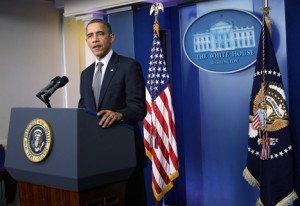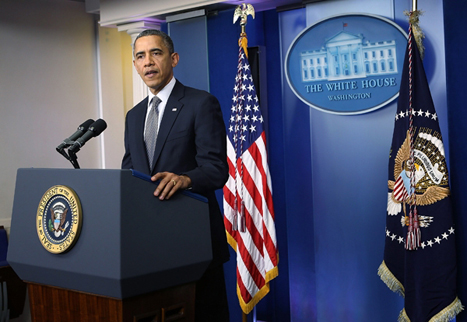 President Barack Obama announced his support for a range of gun control policies this afternoon that addressed not only the threat of mass shootings but also the recurring gun-related violence that takes dozens of lives in the country every day. After his speech, he signed multiple executive measures ordering some immediate changes, while four children who had written to urge him to take action against gun violence stood behind him.
President Barack Obama announced his support for a range of gun control policies this afternoon that addressed not only the threat of mass shootings but also the recurring gun-related violence that takes dozens of lives in the country every day. After his speech, he signed multiple executive measures ordering some immediate changes, while four children who had written to urge him to take action against gun violence stood behind him.
“This is our first task as a society: keeping our children safe. This is how we will be judged,” Obama told an audience that included parents of children killed by a gunman last month at an elementary school in Connecticut. “We can’t put this off any longer.”
The president backed universal background checks for all gun purchases, including those sold privately and at gun shows, a ban on the sale of assault weapons and high-capacity ammunition magazines, increased hiring in law enforcement, and initiatives on mental health and school safety. The last ban on the sale of semi-automatic weapons was signed into law by President Bill Clinton in 1994 and expired after 10 years.
The President acknowledged that major changes to existing federal law require action by Congress – a politically difficult proposition. Congressional Republicans vehemently oppose stricter federal controls over gun ownership, and even some from the president’s own party, like Senate Majority Leader Harry Reid (D-Nev.), have indicated resistance to considering such legislation.
“To make a real and lasting difference, Congress too must act,” he said. “These are common-sense measures. But they will not be easy to enact.”
He urged Americans from all areas of the country, especially those with strong traditions of gun ownership, to contact their legislators to show support for an assault-weapons ban.
“Ask them what’s more important: Doing whatever it takes to get an ‘A’ grade from a gun lobby that funds their campaign, or giving parents some peace of mind when they drop their child off for first grade?” the President asked to applause from the audience.
He believed in the rights of gun owners and sportsmen, Obama said. “I also believe most gun owners agree that we can respect the Second Amendment while keeping an irresponsible, law-breaking few from inflicting harm on a massive scale,” he said.
The Centers for Disease Control and Prevention and other federal bodies should conduct more research into the causes and impact of gun violence, he said. “We don’t benefit from ignorance. We don’t benefit from not knowing the science behind this epidemic of violence,” Obama said.
Obama will nominate the acting head of the Bureau of Alcohol, Tobacco, Firearms and Explosives, B. Todd Jones, to be its permanent head, he said. The agency, which enforces federal gun laws, has been without a permanent administrator for six years.
Prompted by the murder of 26 people at an elementary school in Newtown, Conn., in December, the president’s announcements come after a month-long task force led by Vice President Joe Biden put forward recommendations this week on steps the federal government can take to reduce gun violence.
Since late December, Biden and his staff have consulted with dozens of stakeholder groups, including child welfare and juvenile justice advocates, into the causes of gun violence and research-based actions to prevent it.
About 30 people in the United States die in gun-related incidents every day, according to Jon Vernick, the co-director of the Center for Gun Policy and Research at the Johns Hopkins Bloomberg School of Public Health.
Led by Vernick, about 20 gun policy experts with backgrounds in medicine, public health, law and public safety released their own list of policy recommendations yesterday, reaching consensus at the end of a two-day summit at Johns Hopkins University in Baltimore, Md. New York City Mayor Michael Bloomberg, an independent, and Maryland Gov. Martin O’Malley, a Democrat, opened the summit.
The summit’s recommendations, which broadly echo the measures announced by Obama this afternoon, included banning the sale of assault weapons, strengthening background checks and other measures to keep weapons out of the hands of high-risk people, such as those convicted of violent crimes and those with mental illness. A juvenile convicted of a violent crime should wait until age 30 before being allowed to buy a gun, the experts recommended.
Summit participants also called for the federal government to appoint a permanent leader of theBureau of Alcohol, Tobacco, Firearms and Explosives, which enforces federal gun laws, and to fund more research by the Centers for Disease Control and Prevention, the National Institutes of Health and the National Institute of Justice on the factors behind gun violence and ways to address them.
The national debate over gun control sparked by the Connecticut school shootings is already showing results at the state level. Yesterday, the New York state assembly approved, and Gov. Andrew Cuomo signed into law, a wide-ranging bill banning sales of assault weapons and tightening measures meant to keep guns from people with mental illness. New York is the first state to change its gun control laws after the Connecticut shootings.
More states could follow. At least five state governors have mentioned gun violence in their state-of-the-state speeches this month, which outline top policy concerns for the coming year, according to Governing magazine, which is keeping a running tally of governor proposals on the subject.
Not all of those governors mentioned stricter gun control. Republican governors Bob McDonnell of Virginia and Butch Otter of Idaho focused on improved mental health services, according to the magazine.
An overwhelming majority of Americans, 85 percent, support strengthening background checks on gun sales to include those sold privately and at gun shows, while 55 percent support a ban on assault-style weapons, according to a poll released Monday by the Pew Research Center for the People and the Press.
The poll surveyed more than 1,500 adults in the second week of January, more than two weeks after the school shootings in Newtown, Conn.
Photo courtesy of The White House.
